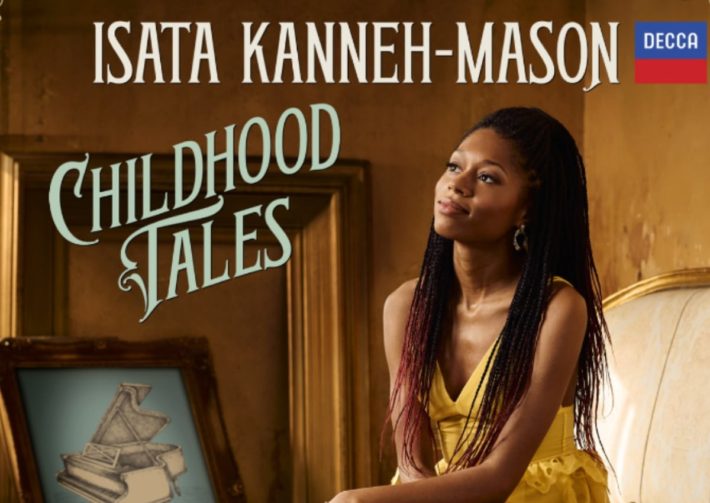While Isata Kanneh-Mason’s previous albums (two of which we reviewed back in 2021 and 2019) have always had some thematic basis, “Childhood Tales” might be her most personal one to date: her ebullient forward opens with fond childhood memories while her commentary on the featured repertoire reveals specific connections and inspirations.
The foundation of the album, Kanneh-Mason says, is Dohnányi’s Variations on a Nursery Song. The universally recognizable theme has a few playful twists and turns, including an interchange between piano and bassoon toward the end which may elicits a chuckle. The Royal Liverpool Philharmonic Orchestra in the third variation will sweep listeners off their feet with buoyant, well-timed ebbs and flows. The piano plays a more supportive role here, and Kanneh-Mason’s rolling arpeggios are a perfect fit to the dreamy character. A series of surprise color changes greets our ears at 0’55”, though the pianist could add a little more sparkle to Dohnányi’s delightful runs. The finale has a Mozartean or early-Beethovinian flair from the playful opening dialogue to the light contrapuntal textures that immediately follow. The playing, especially from the orchestra, is light yet pristine; what results is an exciting buzz that builds into a jubilant (and, for the soloist, a virtuosic) conclusion.
That Kanneh-Mason chooses to include Mozart’s “Ah vous dirai-me, maman” is a no-brainer given the thematic overlap with the Dohnányi. We can hear the effortlessness in her fast fingerwork and deftly executed ornamentation throughout. However, the interpretation needs more personality. A large part of this might have to do with how she handles repeats of phrases: in the theme, for instance, there isn’t a whole lot of variation between the opening line and its echo. While this in and of itself is not terribly problematic, it becomes a recurring issue across multiple variations. The resulting absence of dimensionality feels a bit frustrating. Turn to Lang Lang’s version (DG) and you’ll hear a lot more in the way of creativity: in the theme, for example, he experiments with both articulation and dynamics which captures the improvisatory spirit.
Related Posts
- Review: “Carnival of the Animals” – The Kanneh-Masons
- Review: Muse – Sheku and Isata Kanneh-Mason
- Review: “Carte Blanche” – Jean-Yves Thibaudet, Piano
In Kinderszenen, Schumann does far more than merely create images of childhood: his writing captures the essence of youth by way of innocent charm (Von fremden Ländern und Menschen), vivacious curiosity (Kuriose Geschichte), and melancholy (Kind im Einschlummern). While Kenneth-Mason’s playing is clean and free from any gimmicky mannerisms, it doesn’t capture the vibrancy I was hoping for. Traumerei, for instance, ultimately proves a disappointment, sounding far too forward and uniform: perhaps a matter of taste, but the phrases feel metronomic and wooden with not enough character distinction between them—especially in light of other, more successful renditions like Horowitz’ from his 1967 Carnegie Hall concert. He manages to uphold the lyric integrity of the lines with the appropriate forward momentum but not at the expense of expression: the magic appears in how the peaks of phrases hang wistfully or how the ends of phrases are attended to with an ineffable tenderness. The final piece, Der Dichter Spricht, certainly has some nice color changes in the middle but, on the whole, doesn’t possess the deep level of reflection or profundity that landmarks by Arrau or Argerich have. Kanneh-Mason’s playing is admittedly declamatory but doesn’t have as much fluidity which is necessary in creating the delicate balance between speech and contemplation.
Debussy’s L113 Children’s Corner makes for a lovely listen though again, it errs on being fairly even-keeled. There is a lovely understatedness in Doctor Gradus ad Parnassum in the pianist’s smooth tone that creates an aura of warmth. A version like Bavouzet’s, however, shows more perceptible variations in harmonic color and articulation. The much-loved Cakewalk is nice—but just that: at the heart of the work is a sense of humor that, with the right amount of energy and boldness, comes to life. Things do sound promising enough but the true character of the comedy never fully emerges. Perhaps it’s the held-back fortes or the need for more zest even in the softer sections.
While the selection of repertoire on this album is undoubtedly pleasing, it is unfortunate that the performances do not fully seize the opportunity to offer a distinctive perspective on these beloved compositions. As a result, listeners may find greater satisfaction exploring other referenced recordings that delve deeper into the nuances of these well-known works.

Childhood Tales
Isata Kanneh-Mason – Piano
Royal Liverpool Philharmonic Orchestra
Domingo Hindoyan – Conductor
Decca CD 4854180
Recommended Comparisons
Horowitz | Arrau | Argerich | Bavouzet
Read more classical music reviews or visit The Classic Review Amazon store
Follow Us and Comment:
[social_icons_group id=”964″]
[wd_hustle id=”HustlePostEmbed” type=”embedded”]











